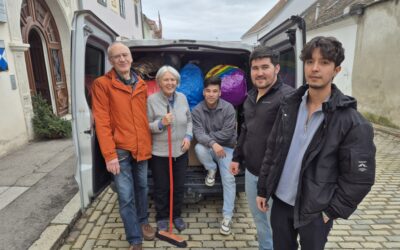 Grape pickers come to Loppiano from all over Europe during the months of September and October. Members and friends of the cooperative, they are of all ages and walks of life. Every year they offer some days, at most two weeks, free of charge to help the paid workers with the grape harvest. Why should anyone choose to use part of their holidays to do something not even always pleasant? The timetable works with military precision: breakfast at 7:30, then at 8:00 leave for work, at 12:00 noon the midday meal, and then work in the fields until evening. There is time for relaxation and, for those who wish, there is Mass at the shrine of Maria Theotokos, after which the evening proceeds with another meal and the chance to mix with other people living at Loppiano. Despite the exacting rhythm, everyone is enthusiastic, even grateful. In part this is because here there is a way of doing things that takes account of human persons and there is direct and constant contact with nature. Still more, though, the grape pickers experience the atmosphere of fraternity that is the essence of every single day of the life of the farm and of the little town of Loppiano. As they tell one another about their lives and experiences between one vine and the next, they help each other cope with the hard work and find themselves having moments of real hilarity.
Grape pickers come to Loppiano from all over Europe during the months of September and October. Members and friends of the cooperative, they are of all ages and walks of life. Every year they offer some days, at most two weeks, free of charge to help the paid workers with the grape harvest. Why should anyone choose to use part of their holidays to do something not even always pleasant? The timetable works with military precision: breakfast at 7:30, then at 8:00 leave for work, at 12:00 noon the midday meal, and then work in the fields until evening. There is time for relaxation and, for those who wish, there is Mass at the shrine of Maria Theotokos, after which the evening proceeds with another meal and the chance to mix with other people living at Loppiano. Despite the exacting rhythm, everyone is enthusiastic, even grateful. In part this is because here there is a way of doing things that takes account of human persons and there is direct and constant contact with nature. Still more, though, the grape pickers experience the atmosphere of fraternity that is the essence of every single day of the life of the farm and of the little town of Loppiano. As they tell one another about their lives and experiences between one vine and the next, they help each other cope with the hard work and find themselves having moments of real hilarity.  Ambrogio Panzieri from northern Italy put it like this: ‘For a very long time I’ve not felt such intensity – both humanly and spiritually. It’s as if I’ve always known these people who are willing to encourage me and give me the strength to believe that even at home I will be able to bring the same joy, the same mutual gift of ourselves to one another.’ Antonio Sottani, who has been at the farm for 15 years, summed it up like this: ‘Certainly at the basis of everything there is the generosity of the members and friends of our cooperative. We offer board and lodging, but above all the chance, while at work, to have an experience together of doing things for and with one another. It sometimes happens, in fact, that after a few says the grape pickers feel the need to change how they live their lives, to face up to tough situations in their hometowns and in their families, bringing love into places where it does not exist. But for our part we don’t do anything in particular, we simply try to love them.’
Ambrogio Panzieri from northern Italy put it like this: ‘For a very long time I’ve not felt such intensity – both humanly and spiritually. It’s as if I’ve always known these people who are willing to encourage me and give me the strength to believe that even at home I will be able to bring the same joy, the same mutual gift of ourselves to one another.’ Antonio Sottani, who has been at the farm for 15 years, summed it up like this: ‘Certainly at the basis of everything there is the generosity of the members and friends of our cooperative. We offer board and lodging, but above all the chance, while at work, to have an experience together of doing things for and with one another. It sometimes happens, in fact, that after a few says the grape pickers feel the need to change how they live their lives, to face up to tough situations in their hometowns and in their families, bringing love into places where it does not exist. But for our part we don’t do anything in particular, we simply try to love them.’
Don’t be discouraged by failure
Don’t be discouraged by failure





0 Comments